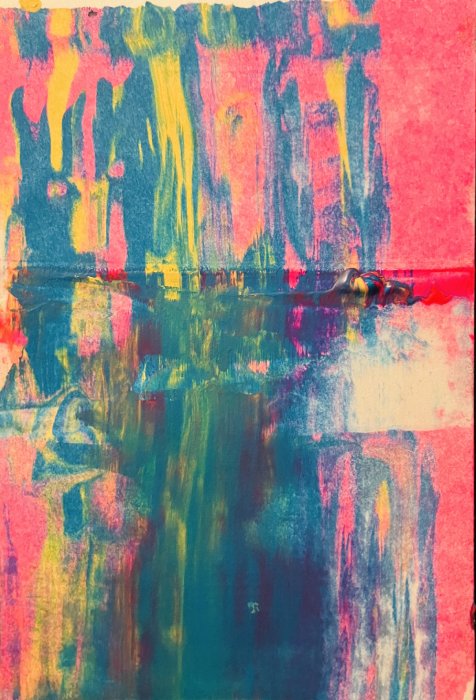Flash Nonfiction
by L.E. Pinto

Beneath his furrowed brow, the larger-than-life fat man’s gray eyes remain permanently fixed in a mid-range gaze that never notices who is in his path. Beads of perspiration stipple his forehead as his parted lips accept an equally sweaty hot dog.
“The self-loathing!” my brother Robert used to gasp, smirking and gesturing toward the enormous canvas that dominated his living room. He marvelled in the painting’s grotesque aesthetic and unwitting homoeroticism.
My brother acquired Gourmand in the early 2000s from his friend Ken Grahame. Part of Grahame’s portraiture series in oil based on found photos, Gourmand depicts a competitive eater who appeared in an issue of Colours Magazine. He first painted a small version, then scaled it up after seeing people’s intense reactions to it.
Robert died very suddenly in 2015. With no assets to speak of, and survived only by our parents and me, we held onto whatever mementos we could. Things, possessions, artifacts — they are the traces that linger like ghosts of the soul lost. Adam and I took the painting.
A philosopher by way of hobby not profession, my brother sometimes spoke of conjuring spectres — but not the human/spiritual kind. He flirted with post-structuralism, frequently luring me into playful, impromptu discussions about radical thinkers such as Derrida or Deleuze or Debord. In some of those conversations, he explained that Jacques Derrida’s philosophical hauntology consists of metaphors, not actual ghosts.
A few months after my brother’s death, his friend Kelly contacted me. Suzy, she told me, had news for me, but was dismayed to the point that she didn’t want to disclose anything right now. “And besides,” Kelly said, “she’s about to travel. But she has a message from a psychic. Maybe we can all get together when she’s back in town.”
“Please Kelly, can you just tell me?”
“Suzy doesn’t believe in psychic stuff. But a neighbour had an extra ticket to one of those big events with a medium. Suzy wasn’t even going to go, but at the last minute, she did.”
“I don’t believe in that sort of thing, either,” I told her. At least not since I was a teenager, handing over my part-time wages to questionable fortune tellers at the local psychic fair. Adam, on the other hand, can’t get enough of cable ghost-hunting programs and fancies himself an amateur paranormal investigator.
“The medium picked Suzy out of the audience,” Kelly explained. “‘I have a message,’ the psychic told her, ‘not for you. This male presence, he says, tell my sister I love her. Tell her it was all an accident. I’m so sorry. I’m sorry. I didn’t mean for this to happen.’”
I’m sorry, so sorry. Robert left scattered a trail of controversial choices in life, for which he often expressed remorse. He frequently phoned late at night, crying and apologizing. I’m so sorry. I’m sorry. Sorry.
Adam was intrigued by the psychic’s message. “The painting!” he said with renewed confidence in a theory he had built since Gourmand found its place over his sofa. He playfully hypothesized that Gourmand was a portal, trying to convince me that it conveyed messages to Robert in another realm.
“Don’t say it to me, tell your brother,” Adam constantly chided me, pointing at the mammoth fat man. Perhaps he was on to something, though my own spectral communication with Robert is very different from the paranormal sort that Suzy experienced.
It’s not an entirely bad habit, chattering with the spirits. It can be comforting — even therapeutic — to tell my brother how I’m feeling, pose questions and speculate how he might react to current events or political happenings. Even read him a draft of a work-in-progress.
Shortly before his own death, Derrida spoke of a desire to leave traces — both objects and gestures — for heirs to inherit and use in what he believed was a never-ending process of mourning. Together, aesthetic, intellectual, and emotional traces allow those left behind, in Derrida’s words, “to speak always of the spectre, to speak to the spectre, to speak with it, therefore especially to make or to let a spirit speak.”

Rather than a ghostly ethereal form, my brother exists in conversations mediated by tangible and intangible traces he left behind. He survives each time those traces help those who knew him mourn his passing — two important ones being the philosophical ideas he shared, and the painting. I can imagine my brother quoting Derrida: “The trace I leave signifies to me at once my death, either to come or already come upon me, and the hope that this trace survives me.”
Those traces — especially the larger-than-life Gourmand gazing in my direction from above the sofa — lure me into spectral conversations, just as Derrida described. The never-complete process of mourning my brother occurs, in part, through the portal. Sometimes, I ask my brother if he ever envisioned the role this painting would serve after he left the earth. I look into the fat man’s eyes, and imagine that he did.
Appeared in Issue Fall '23
Nationality: Canadian
First Language(s): Lithuanian
Second Language(s):
English
Das Land Steiermark

Listen to L.E. Pinto reading "The Portal".
Supported by:

